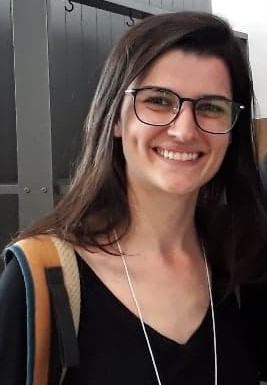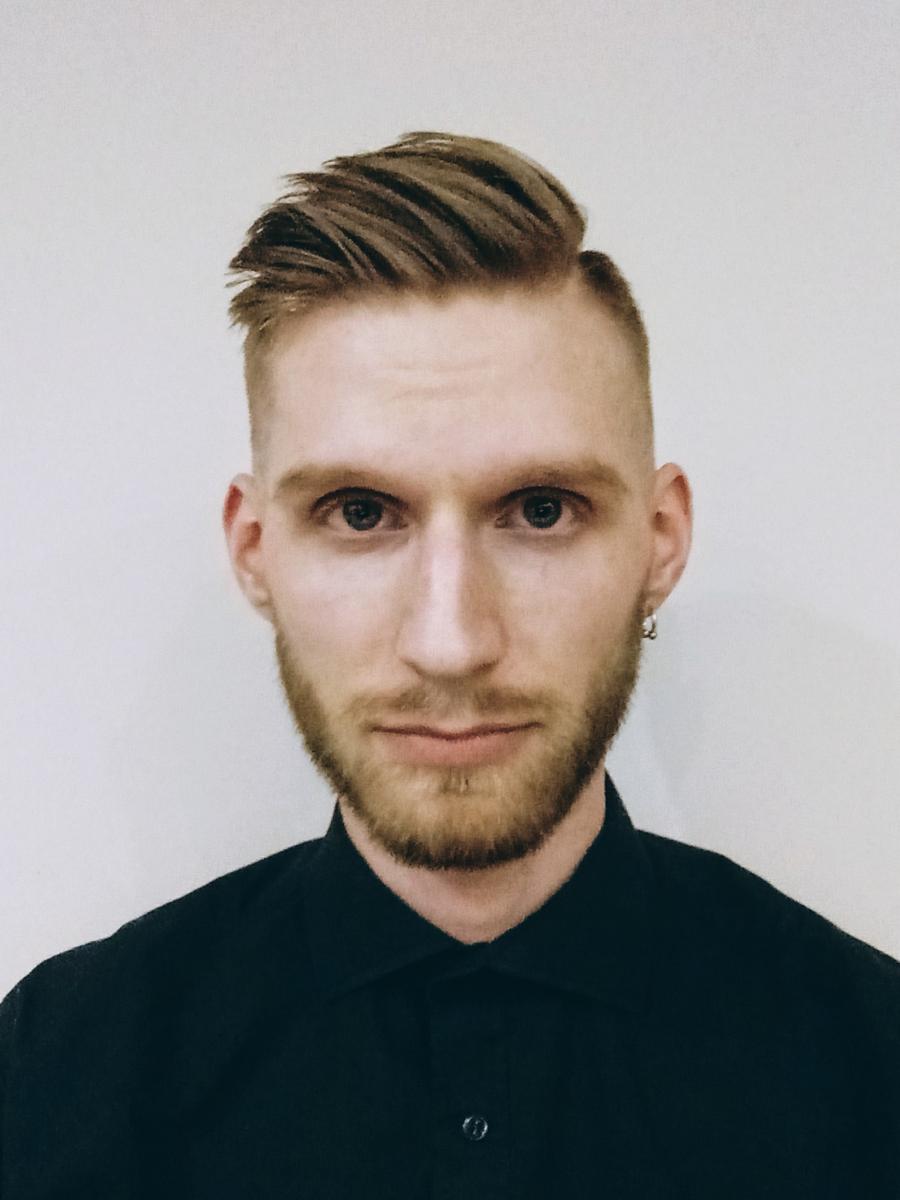2019 ACBS Diversity, Equity and Inclusion Scholars
2019 ACBS Diversity, Equity and Inclusion ScholarsBrazil Dissemination Activities 2019
Brazil Dissemination Activities 2019Laís Nicolodi, Brazil
Could you please tell us a little about you and your background?
My name is Laís Nicolodi, I’m Brazilian and I live in the city of São Paulo. I’m currently a Master’s Degree student at University of São Paulo in the field of Behavioral Science and Feminism Issues, and my main object of study are the effects of how a patriarchal culture can influence in society as well, such as the power imbalance between men and women in general. I’m also a clinical psychologist in São Paulo, working especially with women issues and LGBT community.
How did you become interested in CBS?
I’ve started to learn more about the CBS when I was an undergraduate student of psychology. Since I’ve started to become more involved with the Brazilian community of ACBS, I had the opportunity to discuss with great people how could we add efforts to think of a way to promote welfare of political minorities in our environment, especially as clinical psychologists professionals. I’ve had clinical supervisors that were experts in FAP, and it was amazing to find out that there were already studies in the field of behavioral therapies that sought to consider gender and racial variables inside the relation between the patient and therapist.
Could you tell us about your research and application interests?
As a clinical psychologist committed with the values of Human Rights, especially considering the background where I’m inserted in (the Latin-American community of women) I believe that Behavioral Contextual Science, mainly Acceptance and Commitment Therapy, can contribute to develop therapeutic processes that contemplates the reality of vulnerable women who have suffered gender violence, in a sensitive and generous way, and that considers the social background of a structural racism and sexist social system.
Could you tell us about your experience at the World Conference this year?
The year of 2019 was the year of my first ACBS World Conference, and it was also my first International Conference of my entire life. I’m so grateful and honored to have had the opportunity to meet incredible people from all over the world. The conference had not just contributed to me in a professional way as a better psychologist, but also contributed to me in my personal development as a human being. Meeting Steven Hayes in person and having the opportunity to learn with him more about ACT was very inspiring and stimulating.
The ambassador and ambasadee program also made me feel very welcomed because I’ve met great women who were very friendly and welcoming with me, such as Holly Yates, Miranda and Temple Morris, and Mary Hughes. Everybody from the Diversity Equity and Inclusion Committee were amazing too, people like Lucia Loureiro helped me a lot to make me feel more included in the ACBS Conference. Also, the Women’s SIG and the Diversity Equity and Inclusion SIG provided me great opportunities for meeting people from different countries from all over the world, such as Poland and Hong Kong, and share our experiences in common as students with different backgrounds and who lived very far from there. It was very warming to find out the members of Latin America that were present there too, because it made me feel even more connected with the ACBS community. And finally, it was wonderful to meet all the Brazilian community who were present in the ACBS Conference, I would never been able to meet them inside Brazil if it wasn't for the Conference of this year.
Was there anything that stood out to you about the CBS community? I would like to highlight one of the best moments I’ve had in the ACBS Conference. The Janet Helms Plenary about Power Dynamics of White Racial Identity in Social Interactions was very potent and inspiring because of everything I believe in. I was positively surprised by CBS community for choosing such a great and inspiring professional such as Janet Helms for the plenary. It was great to feel that everybody in the audience were so open-minded to discuss about white privilege and power relations among society. It made me feel honored to be a part of a community that includes racial debates inside the context of psychology and contextual behavioral sciences.
What did you take back from your experience that has been helpful to you?
I could say that 100% of my entire experience in the Conference was very helpful to me. Considering my main values as a psychologist committed with political values that fights against violence against women and structural racism, I would say that the lessons I’ve learn in Janet Helms’s plenary I will carry with me in my practice as a psychologist for all time. The Steven Hayes’s lectures that I’ve participated in, as well, have also helped me a lot to improve my professional skills as an ACT therapist. Those were the 2 most helpful events for me during the conference because both of them were very aligned with everything I believe in, especially in my clinical application as a contextual behavioral therapist.
Do you have anything else that you would like to share with the community?
I would never been able to live all these great experiences if it wasn’t for the scholarship program developed by the Diversity Equity and Inclusion Committee. Thank you once more for everything you provided. And congratulations for the initiative, I hope even more students from all over the world from different background, especially political minorities, may have the same opportunities very soon.
Are you wondering how you can help to disseminate CBS in the developing world through scholarship opportunities like this? Please consider donating to the Diversity, Equity and Inclusion Fund via Paypal by using the button below. Your donation will help us continue to bring increased diversity to our annual conferences by providing funds for individuals who come from diverse backgrounds and who would not be able to attend an ACBS conference without this added financial support.
Every dollar/euro/yen goes to helping those in need -- not a nickel goes to administration. Money collected for this fund is distributed by an ACBS Diversity, Equity and Inclusion committee. Scholarships are awarded based on need and merit.
Please note that this contribution does not qualify as a tax-deductible charitable contribution, according to USA tax law ... but it's a nice thing to do.
Poland Dissemination Activities 2019
Poland Dissemination Activities 2019Jan Topczewski, Poland
Could you please tell us a little about you and your background?
My name is Jan Topczewski. I am a 1st year student of PhD programme in psychology at SWPS University of Social Sciences and Humanities in Warsaw, Poland. I’m also engaged in LGBTQ mental health activism - I work as acounsellor and training consultant in LGBTQ crisis hotline hosted by Lambda Warsaw Association. We are one of the very few organisations providing free mental health services (individual and group therapy, workshops, email counselling, crisis hotline) for gender and sexually diverse folks, and currently the only one doing it on a country-wide scale. We serve individuals who experienced extreme violence and abuse based on their sexual orientation and gender identity, “conversion therapy” survivors, LGBTQ minors or people coming from low socioeconomic background who cannot afford counselling with properly trained and culturally-sensitive clinicians.
How did you become interested in CBS?
In 2014, during my 1st year of BA in psychology, I attended Joe Oliver’s brief workshop on using ACT with people with unusual (psychotic) experiences. It was my first contact with Relational Frame Theory and concept of experiential avoidance. I found it really compelling, but I had not fully appreciated it until I started reading about CBS approach in general. For me pragmatic roots, depathologizing stance towards human suffering and sensitivity to social justice were especially important aspects. It turned out that combining scientific “precision, scope and depth” with deep social engagement is possible and people are already doing it. I knew I had to get on board.
Could you tell us about your research and application interests?
My PhD research project is focused on functional-contextual account of self/perspective taking difficulties in people coming from violent, invalidating environments (and commonly labeled as having “borderline personality disorder”). My hope is that recent developments in RFT will prove to be useful in understanding self(ing)-related challenges faced by people with such experiences.
As a practitioner, I’m very much interested in applying mindfulness and acceptance-based approaches to empower the LGBTQ community. Moreover, the intersection between critical psychology and contextual behavioral science is very relevant for my work. Every day I see how providing psychological support for individuals without addressing cultural practices contributing to "problems in living" is not enough. Hence, my interest is also in PROSOCIAL approach, the work of Bernard Guerin and in experimental communities inspired by B.F. Skinner’s Walden Two.
Could you tell us about your experience at the World Conference this year?
It was a period of intensive experiential learning. I was doing mainly RFT track and every day I had some "aha" moments. Entering new community without knowing almost anyone was very challenging, but it gave me the opportunity to talk and share with many people. There was a lot of "small things" that made a huge difference - smiles, meaningful conversations, acts of encouragement, tears, hugs. After six months, the memories are still vivid and heartwarming.
Was there anything that stood out to you about the CBS community?
Egalitarianism. People were approachable and warm regardless of their degree and profession. I felt the spirit of openness and cooperation instead of competition. Scientific culture shaped in such manner is absolutely unique.
What did you take back from your experience that has been helpful to you?
I refined my understanding of empirical and conceptual advances in RFT, which really helps me with my doctoral research. I also had the opportunity to take first steps towards collaboration with other CBS labs.
At the same time it was an important week for clinical skills building. Attending workshops such as “Process-based CBT, Sexual Orientation, and Gender Diversity” facilitated by Aisling Curtin, Matthew Skinta and lore dickey reoriented my development as a counsellor. During deeply moving real-play with Aisling, I remember thinking: “This is really how I want to work...”
Do you have anything else that you would like to share with the community?
I'd like to express my gratitude to DEI Committee and numerous donators. This experience wouldn't be possible without your hard work and support. Thank you!
Are you wondering how you can help to disseminate CBS in the developing world through scholarship opportunities like this? Please consider donating to the Diversity, Equity and Inclusion Fund via Paypal by using the button below. Your donation will help us continue to bring increased diversity to our annual conferences by providing funds for individuals who come from diverse backgrounds and who would not be able to attend an ACBS conference without this added financial support.
Every dollar/euro/yen goes to helping those in need -- not a nickel goes to administration. Money collected for this fund is distributed by an ACBS Diversity, Equity and Inclusion committee. Scholarships are awarded based on need and merit.
Please note that this contribution does not qualify as a tax-deductible charitable contribution, according to USA tax law ... but it's a nice thing to do.